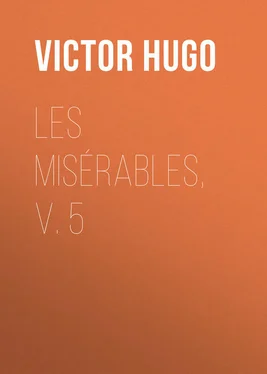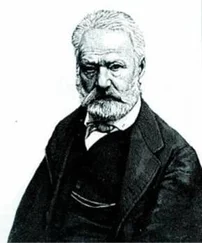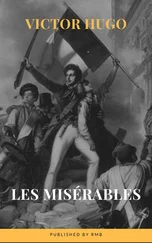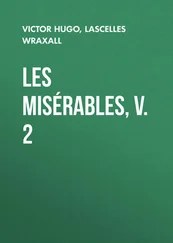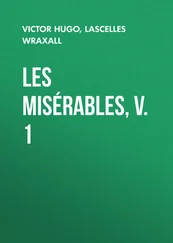Victor Hugo - Les Misérables, v. 5
Здесь есть возможность читать онлайн «Victor Hugo - Les Misérables, v. 5» — ознакомительный отрывок электронной книги совершенно бесплатно, а после прочтения отрывка купить полную версию. В некоторых случаях можно слушать аудио, скачать через торрент в формате fb2 и присутствует краткое содержание. Жанр: literature_19, foreign_antique, foreign_prose, на английском языке. Описание произведения, (предисловие) а так же отзывы посетителей доступны на портале библиотеки ЛибКат.
- Название:Les Misérables, v. 5
- Автор:
- Жанр:
- Год:неизвестен
- ISBN:нет данных
- Рейтинг книги:3 / 5. Голосов: 1
-
Избранное:Добавить в избранное
- Отзывы:
-
Ваша оценка:
- 60
- 1
- 2
- 3
- 4
- 5
Les Misérables, v. 5: краткое содержание, описание и аннотация
Предлагаем к чтению аннотацию, описание, краткое содержание или предисловие (зависит от того, что написал сам автор книги «Les Misérables, v. 5»). Если вы не нашли необходимую информацию о книге — напишите в комментариях, мы постараемся отыскать её.
Les Misérables, v. 5 — читать онлайн ознакомительный отрывок
Ниже представлен текст книги, разбитый по страницам. Система сохранения места последней прочитанной страницы, позволяет с удобством читать онлайн бесплатно книгу «Les Misérables, v. 5», без необходимости каждый раз заново искать на чём Вы остановились. Поставьте закладку, и сможете в любой момент перейти на страницу, на которой закончили чтение.
Интервал:
Закладка:
"Fire!" shouted Enjolras.
The whole barricade burst into a flame, and the detonation was frightful; an avalanche of smoke covered and concealed the gun and the men. A few seconds after the cloud was dispersed, and the gun and the men reappeared; the gunners were bringing it up to the front of the barricade, slowly, correctly, and without hurry; not one had been wounded. Then the captain of the gun, hanging with his whole weight on the breech to elevate the muzzle, began pointing the gun with the gravity of an astronomer setting a telescope.
"Bravo for the artillery!" cried Bossuet.
And all the men at the barricade clapped their hands. A moment after the gun, standing in the very centre of the street across the gutter, was in position, and a formidable mouth yawned at the barricade.
"Come, we are going to be gay," said Courfeyrac. "Here is the brutality; after the fillip the blow with the fist The army is extending its heavy paw toward us, and the barricade is going to be seriously shaken. The musketry-fire feels, and the cannon takes."
"It is an eight-pounder of the new pattern in bronze," Combeferre added. "Those guns, if the proportion of ten parts of tin to one hundred of copper is exceeded, are liable to burst, for the excess of tin renders them too soft. It thus happens that have holes and cavities in the vent, and in order to obviate this danger and be able to load, it would perhaps be advisable to revert to the process of the 14th century, circling and reinforcing the gun with a series of steel rings, without any welding from the breech to the trunnions. In the mean while they remedy the defect as well as they can, and they manage to discover where the holes are in the vent of the gun by means of a searcher; but there is a better method in Gribeauval's movable star."
"In the 16th century," Bossuet observed, "guns were rifled."
"Yes," Combeferre replied; "that augments the ballistic force, but lessens the correctness of aim. At short distances the trajectory has not all the desirable rigidness, the parabola is exaggerated, the path of the projectile is not sufficiently rectilinear for it to hit intermediate objects, though that is a condition of fighting whose importance grows with the proximity of the enemy and the precipitation of the firing. This defective tension of the curve of the projectile in rifled cannon of the 16th century emanated from the weakness of the charge; weak charges for such engines are imposed by the ballistic necessities, such, for instance, as the preservation of the carriage. After all, the cannon, that despot, cannot do all that it wishes, and strength is a great weakness. A cannon-ball goes only six hundred leagues an hour, while light covers seventy thousand leagues per second. This is the superiority of Jesus Christ over Napoleon."
"Reload your guns," said Enjolras.
In what manner would the revetment of the barricade behave against a cannon-ball? Would a breach be formed? That was the question. While the insurgents were reloading their guns the artillerymen loaded the cannon. The anxiety within the redoubt was profound; the shot was fired, and the detonation burst forth.
"Present!" a joyous voice cried.
And at the same time as the cannon-ball struck the barricade, Gavroche bounded inside it. He came from the direction of the Rue du Cygne, and actively clambered over the accessory barricade which fronted the labyrinth of the Little Truanderie. Gavroche produced greater effect at the barricade than the cannon-ball did; for the latter was lost in the heap of rubbish. It had broken a wheel of the omnibus, and finished the old truck, on seeing which the insurgents burst into a laugh.
"Persevere!" cried Bossuet to the gunners.
CHAPTER VIII
THE ARTILLERY SETS TO WORK IN EARNEST
Gavroche was surrounded, but he had no time to report anything, as Marius, shuddering, drew him on one side.
"What have you come to do here?"
"What a question?" the boy said; "and you, pray?"
And he gazed fixedly at Marius with his epic effrontery: his eyes were dilated by the proud brightness which they contained. It was with a stern accent that Marius continued, —
"Who told you to return? I only trust that you have delivered my letter at its address."
Gavroche felt some degree of remorse in the matter of the letter; for, in his hurry to return to the barricade, he had got rid of it rather than delivered it. He was forced to confess to himself that he had confided somewhat too lightly in this stranger, whose face he had not even been able to distinguish. It is true that this man was bareheaded, but that was not enough. In short, he reproached himself quietly for his conduct, and feared Marius's reproaches. He took the simplest process to get out of the scrape, – he told an abominable falsehood.
"Citizen, I delivered the letter to the porter. The lady was asleep, and she will have the letter when she wakes."
Marius had two objects in sending the letter, – to bid Cosette farewell and save Gavroche. He was obliged to satisfy himself with one half of what he wanted. The connection between the Bending of the letter and M. Fauchelevent's presence at the barricade occurred to his mind, and he pointed him out to Gavroche.
"Do you know that man?"
"No," said Gavroche.
Gavroche, in truth, as we know, had only seen Jean Valjean by night. The troubled and sickly conjectures formed in Marius's mind were dissipated. Did he know M. Fauchelevent's opinions? Perhaps he was a republican; hence his presence in the action would be perfectly simple. In the mean while Gavroche had run to the other end of the barricade, crying, "My gun!" and Courfeyrac ordered it to be given to him. Gavroche warned "his comrades," as he called them, that the barricade was invested, and he had found great difficulty in reaching it. A battalion of the line, with their arms piled in the Little Truanderie, was observing on the side of the Rue du Petit Cygne; on the opposite side the Municipal Guard occupied the Rue des Prêcheurs; while in front of them they had the main body of the army. This information given, Gavroche added, —
"I authorize you to give them a famous pill."
Enjolras was in the mean while watching at his loop-hole with open ears; for the assailants, doubtless little satisfied with the gun-shot, had not repeated it. A company of line infantry had come up to occupy the extremity of the street behind the gun. The soldiers unpaved the street, and erected with the stones a small low wall, a species of epaulement, only eighteen inches high, and facing the barricade. At the left-hand angle of this work could be seen the head of a suburban column, massed in the Rue St. Denis. Enjolras, from his post, fancied he could hear the peculiar sound produced by canister when taken out of its box, and he saw the captain of the gun change his aim and turn the gun's muzzle slightly to the left. Then the gunners began loading, and the captain of the gun himself took the port-fire and walked up to the vent.
"Fall on your knees all along the barricade," Enjolras shouted.
The insurgents, scattered in front of the wine-shop, and who had left their posts on Gavroche's arrival, rushed pell-mell toward the barricade; but ere Enjolras's order was executed, the discharge took place with the frightful rattle of a round of grape-shot; it was one, in fact. The shot was aimed at the opening in the redoubt, and ricochetted against the wall, killing two men and wounding three. If this continued, the barricade would be no longer tenable, for the grape-shot entered it. There was a murmur of consternation.
"Let us stop a second round," Enjolras said: and levelling his carbine he aimed at the captain of the gun, who was leaning over the breech and rectifying the aim. He was a handsome young sergeant of artillery, fair, gentle-faced, and having the intelligent look peculiar to that predestined and formidable arm which, owing to its constant improvement, must end by killing war. Combeferre, who was standing by Enjolras's side, gazed at this young man.
Читать дальшеИнтервал:
Закладка:
Похожие книги на «Les Misérables, v. 5»
Представляем Вашему вниманию похожие книги на «Les Misérables, v. 5» списком для выбора. Мы отобрали схожую по названию и смыслу литературу в надежде предоставить читателям больше вариантов отыскать новые, интересные, ещё непрочитанные произведения.
Обсуждение, отзывы о книге «Les Misérables, v. 5» и просто собственные мнения читателей. Оставьте ваши комментарии, напишите, что Вы думаете о произведении, его смысле или главных героях. Укажите что конкретно понравилось, а что нет, и почему Вы так считаете.
